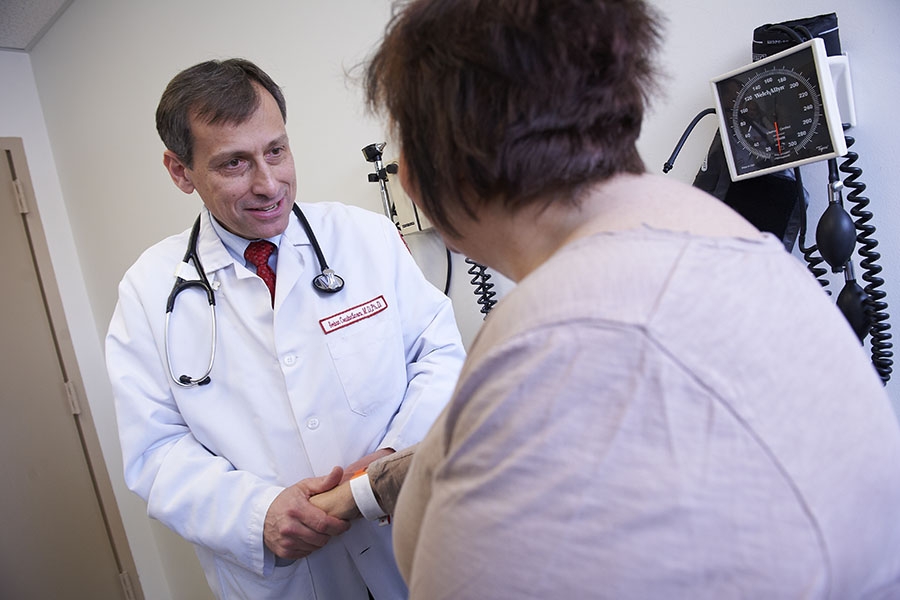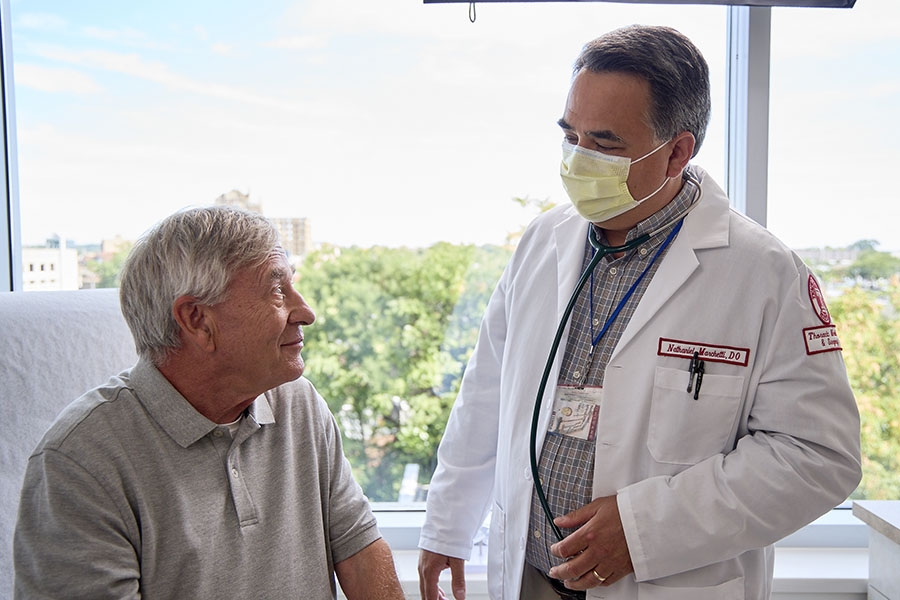At the Temple Lung Center, we take many factors into consideration when deciding if lung transplant is the right treatment for you. We consider all patients in need of a lung transplant on an individual basis, including those who may have been turned down for a transplant at other centers.
Our lung transplant team consists of pulmonologists, surgeons, nurses and social workers who carefully evaluate each individual to determine if a patient is a candidate. During the evaluation process, the team:
- Reviews your medical history
- Conducts diagnostic tests
- Performs a psychological exam
- Gathers information about your support system
Financial staff also work with your health insurance company to determine coverage and/or alternative options.
While lung transplants can extend life expectancy and improve quality of life, there are risks associated with the procedure. Even if our transplant team decides you’re a candidate for lung transplant, you will ultimately decide for yourself if lung transplant is the best option for you and your family.
What you'll learn on this page:
- Lung Transplant Candidate Criteria
- We Consider the Most Difficult Cases
- The Evaluation Process
- The Lung Transplant Waiting List
- Building a Strong Support System
Lung Transplant Candidate Criteria
While transplant centers have the ability to use flexible lung transplant criteria in the evaluation process, including your unique medical and personal history, there are several considerations for a lung transplant that must be met. These considerations have been determined by the International Society of Heart and Lung Transplantation and consist of:
Being a lung transplant candidate includes having end-stage lung disease AND the following:
- Physical ability to survive for 90 days following transplant
- Medical likelihood that you will survive 5 years after transplant
- High risk of death if lung transplant is not performed within 2 years
We Consider the Most Difficult Cases
Our advanced level of training and experience means we consider and accept some of the most complex and challenging cases. Because of this, we’re able to accept some candidates that are typically turned down at other centers. These include patients who:
- Are older than 65 years of age
- Have specific conditions, such as esophageal dysfunction
- Have had a history of heart bypass surgery
- Have a BMI (body mass index) of 32-35
If you meet all the criteria for lung transplant, you’ll then complete the steps to be placed on the lung transplant waiting list.
The Evaluation Process
The evaluation process begins with a series of questions about your physical and mental health. Based on these screening questions, your pulmonologist will decide if you may be eligible for lung transplantation.
You’ll also be required to complete a series of tests. These may include:
- Blood tests
- Cardiac catheterization
- Chest X-ray
- CT scan
- Echocardiogram
- Pulmonary function test (PFT) — including 6-minute walk test and oxygen at rest
- Scans to measure breathing and circulation
- Urine test
This evaluation may also involve a number of tests designed to assess your general health, including:
- Colonoscopy
- Dental exam
- Pap test and mammogram for women
- PSA test for men
Expedited evaluation accommodates your schedule
The Temple Lung Transplant Program takes care to accommodate the needs of every patient during the evaluation process. If you drive a distance to Temple, your pulmonologist will review your records prior to your appointment to help ensure you meet program requirements. Testing is scheduled to coincide with your visit, and results are available for discussion at your consultation visit the following week.
The Lung Transplant Waiting List
The waiting list for a lung transplant or a heart-lung transplant is managed by the United Network for Organ Sharing (UNOS). The time to transplant varies from person to person, and can range from several months to several years.
Donor matching occurs through a computer system that compares donor and candidate data to determine optimal matches. This is based on factors such as blood type, height, weight, distance from the hospital and organ size.
When a donor lung becomes available, you will receive a phone call. Be ready to act quickly and come to the hospital immediately. Prior to this, your transplant team will have checked in to make sure you’re prepared and understand what to expect.
Your procedure may take anywhere from 2 to 10 hours, depending on the type of lung transplant you’re having.
Building a Strong Support System
Temple is with you through every step of the way
Temple offers a support system for you and your caregivers throughout the lung transplant process and recovery. These are the people who are there for you and your family to answer questions, provide you with education and resources, and help ensure you’re receiving the best care.
In addition to the surgical team, which includes specialized nurses who are trained to monitor your condition, you’ll also be cared for by:

